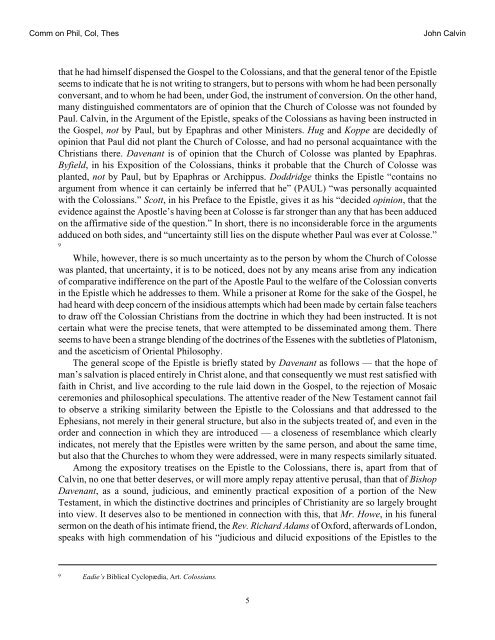Commentary on Philippians, Colossians, and Thessalonians
Commentary on Philippians, Colossians, and Thessalonians
Commentary on Philippians, Colossians, and Thessalonians
Create successful ePaper yourself
Turn your PDF publications into a flip-book with our unique Google optimized e-Paper software.
Comm <strong>on</strong> Phil, Col, Thes<br />
that he had himself dispensed the Gospel to the <strong>Colossians</strong>, <strong>and</strong> that the general tenor of the Epistle<br />
seems to indicate that he is not writing to strangers, but to pers<strong>on</strong>s with whom he had been pers<strong>on</strong>ally<br />
c<strong>on</strong>versant, <strong>and</strong> to whom he had been, under God, the instrument of c<strong>on</strong>versi<strong>on</strong>. On the other h<strong>and</strong>,<br />
many distinguished commentators are of opini<strong>on</strong> that the Church of Colosse was not founded by<br />
Paul. Calvin, in the Argument of the Epistle, speaks of the <strong>Colossians</strong> as having been instructed in<br />
the Gospel, not by Paul, but by Epaphras <strong>and</strong> other Ministers. Hug <strong>and</strong> Koppe are decidedly of<br />
opini<strong>on</strong> that Paul did not plant the Church of Colosse, <strong>and</strong> had no pers<strong>on</strong>al acquaintance with the<br />
Christians there. Davenant is of opini<strong>on</strong> that the Church of Colosse was planted by Epaphras.<br />
Byfield, in his Expositi<strong>on</strong> of the <strong>Colossians</strong>, thinks it probable that the Church of Colosse was<br />
planted, not by Paul, but by Epaphras or Archippus. Doddridge thinks the Epistle “c<strong>on</strong>tains no<br />
argument from whence it can certainly be inferred that he” (PAUL) “was pers<strong>on</strong>ally acquainted<br />
with the <strong>Colossians</strong>.” Scott, in his Preface to the Epistle, gives it as his “decided opini<strong>on</strong>, that the<br />
evidence against the Apostle’s having been at Colosse is far str<strong>on</strong>ger than any that has been adduced<br />
<strong>on</strong> the affirmative side of the questi<strong>on</strong>.” In short, there is no inc<strong>on</strong>siderable force in the arguments<br />
adduced <strong>on</strong> both sides, <strong>and</strong> “uncertainty still lies <strong>on</strong> the dispute whether Paul was ever at Colosse.”<br />
9<br />
While, however, there is so much uncertainty as to the pers<strong>on</strong> by whom the Church of Colosse<br />
was planted, that uncertainty, it is to be noticed, does not by any means arise from any indicati<strong>on</strong><br />
of comparative indifference <strong>on</strong> the part of the Apostle Paul to the welfare of the Colossian c<strong>on</strong>verts<br />
in the Epistle which he addresses to them. While a pris<strong>on</strong>er at Rome for the sake of the Gospel, he<br />
had heard with deep c<strong>on</strong>cern of the insidious attempts which had been made by certain false teachers<br />
to draw off the Colossian Christians from the doctrine in which they had been instructed. It is not<br />
certain what were the precise tenets, that were attempted to be disseminated am<strong>on</strong>g them. There<br />
seems to have been a strange blending of the doctrines of the Essenes with the subtleties of Plat<strong>on</strong>ism,<br />
<strong>and</strong> the asceticism of Oriental Philosophy.<br />
The general scope of the Epistle is briefly stated by Davenant as follows — that the hope of<br />
man’s salvati<strong>on</strong> is placed entirely in Christ al<strong>on</strong>e, <strong>and</strong> that c<strong>on</strong>sequently we must rest satisfied with<br />
faith in Christ, <strong>and</strong> live according to the rule laid down in the Gospel, to the rejecti<strong>on</strong> of Mosaic<br />
cerem<strong>on</strong>ies <strong>and</strong> philosophical speculati<strong>on</strong>s. The attentive reader of the New Testament cannot fail<br />
to observe a striking similarity between the Epistle to the <strong>Colossians</strong> <strong>and</strong> that addressed to the<br />
Ephesians, not merely in their general structure, but also in the subjects treated of, <strong>and</strong> even in the<br />
order <strong>and</strong> c<strong>on</strong>necti<strong>on</strong> in which they are introduced — a closeness of resemblance which clearly<br />
indicates, not merely that the Epistles were written by the same pers<strong>on</strong>, <strong>and</strong> about the same time,<br />
but also that the Churches to whom they were addressed, were in many respects similarly situated.<br />
Am<strong>on</strong>g the expository treatises <strong>on</strong> the Epistle to the <strong>Colossians</strong>, there is, apart from that of<br />
Calvin, no <strong>on</strong>e that better deserves, or will more amply repay attentive perusal, than that of Bishop<br />
Davenant, as a sound, judicious, <strong>and</strong> eminently practical expositi<strong>on</strong> of a porti<strong>on</strong> of the New<br />
Testament, in which the distinctive doctrines <strong>and</strong> principles of Christianity are so largely brought<br />
into view. It deserves also to be menti<strong>on</strong>ed in c<strong>on</strong>necti<strong>on</strong> with this, that Mr. Howe, in his funeral<br />
serm<strong>on</strong> <strong>on</strong> the death of his intimate friend, the Rev. Richard Adams of Oxford, afterwards of L<strong>on</strong>d<strong>on</strong>,<br />
speaks with high commendati<strong>on</strong> of his “judicious <strong>and</strong> dilucid expositi<strong>on</strong>s of the Epistles to the<br />
9 Eadie’s Biblical Cyclopædia, Art. <strong>Colossians</strong>.<br />
5<br />
John Calvin















